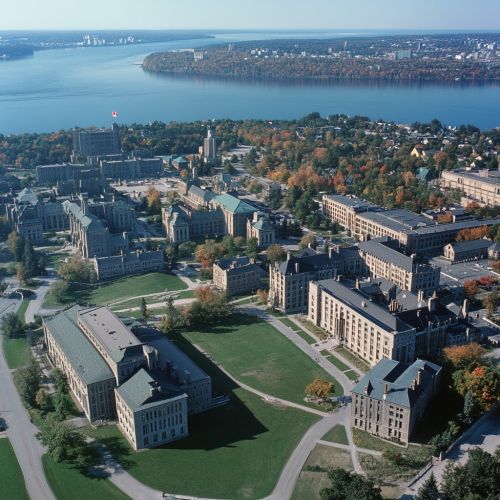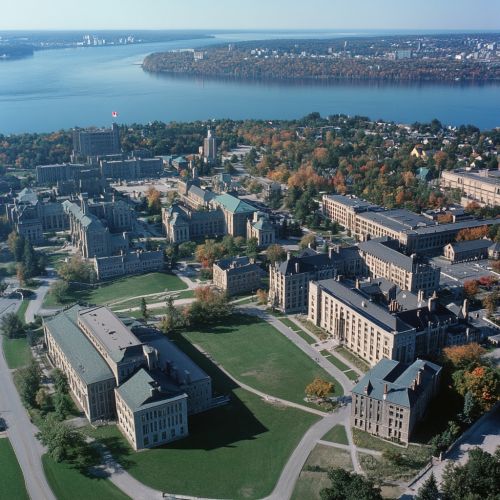Royal Military College of Canada
History
The Royal Military College of Canada (RMC) was established in 1876 in Kingston, Ontario, as a response to the need for a Canadian institution to train military officers. The college was modeled after the West Point and the Royal Military Academy in the United Kingdom. The first class of 18 cadets began their studies in 1876, and the college has since grown to become a premier institution for military education in Canada.
The college's motto, "Truth, Duty, Valour," reflects its commitment to developing leaders of character for the Canadian Armed Forces. Over the years, RMC has evolved to offer a wide range of academic programs, including undergraduate and graduate degrees in engineering, science, and the humanities.
Campus
The RMC campus is located on Point Frederick, a peninsula that extends into the St. Lawrence River. The campus features a blend of historic and modern buildings, including the iconic Mackenzie Building, which houses administrative offices and classrooms. The college also boasts state-of-the-art facilities for research and training, such as the Sawyer Building and the new sports complex.


Academic Programs
RMC offers a diverse array of academic programs designed to prepare cadets for leadership roles in the Canadian Armed Forces. The college is divided into four faculties: Engineering, Science, Arts, and Social Sciences. Each faculty offers a range of undergraduate and graduate programs.
Faculty of Engineering
The Faculty of Engineering is one of the most prestigious at RMC, offering programs in civil, electrical, mechanical, and aeronautical engineering. The faculty is known for its rigorous curriculum and state-of-the-art laboratories, which provide cadets with hands-on experience in their respective fields.
Faculty of Science
The Faculty of Science offers programs in physics, chemistry, computer science, and mathematics. The faculty is committed to advancing scientific knowledge through research and innovation. Cadets in the Faculty of Science have access to cutting-edge research facilities and are encouraged to participate in research projects.
Faculty of Arts
The Faculty of Arts provides a broad education in the humanities and social sciences, with programs in history, political science, economics, and psychology. The faculty emphasizes critical thinking, communication skills, and a deep understanding of human behavior and societal structures.
Faculty of Social Sciences
The Faculty of Social Sciences offers programs in military and strategic studies, international relations, and public administration. The faculty focuses on the study of military history, strategy, and policy, preparing cadets for leadership roles in the Canadian Armed Forces and beyond.
Military Training
In addition to academic programs, RMC places a strong emphasis on military training. Cadets undergo rigorous physical training, leadership development, and military skills training throughout their time at the college. The training program is designed to instill discipline, resilience, and a strong sense of duty.
Physical Training
Physical fitness is a key component of the RMC experience. Cadets participate in daily physical training sessions, which include running, swimming, and strength training. The college also offers a variety of sports and recreational activities, such as rugby, soccer, and hockey.
Leadership Development
Leadership development is a cornerstone of the RMC experience. Cadets are given numerous opportunities to develop their leadership skills through practical experience, such as leading their peers in training exercises and participating in leadership courses. The college also offers specialized leadership programs, such as the Sandhurst Competition, an annual military skills competition held at the United States Military Academy.
Military Skills Training
Military skills training at RMC includes instruction in weapons handling, tactics, and fieldcraft. Cadets participate in regular training exercises, both on campus and at military training areas across Canada. The training program is designed to prepare cadets for the challenges they will face as officers in the Canadian Armed Forces.
Research and Innovation
RMC is a hub of research and innovation, with numerous research centers and institutes dedicated to advancing knowledge in various fields. The college's research efforts are supported by state-of-the-art facilities and a commitment to interdisciplinary collaboration.
Research Centers
RMC is home to several research centers, including the Centre for Security, Armed Forces and Society (CSAFS), the Centre for International and Defence Policy (CIDP), and the Centre for Space Research (CSR). These centers conduct cutting-edge research on topics such as military strategy, international security, and space exploration.
Innovation and Collaboration
RMC actively collaborates with other academic institutions, government agencies, and industry partners to advance research and innovation. The college's research efforts are supported by funding from various sources, including the Canadian government, international organizations, and private industry.
Notable Alumni
RMC has produced many notable alumni who have gone on to distinguished careers in the Canadian Armed Forces, government, and industry. Some of the college's most prominent alumni include General John de Chastelain, former Chief of the Defence Staff; General Rick Hillier, former Chief of the Defence Staff; and astronaut Chris Hadfield.
Traditions and Culture
RMC is steeped in tradition and has a rich cultural heritage. The college's traditions and customs play a significant role in shaping the cadet experience and fostering a sense of camaraderie and pride among cadets.
The RMC Band
The RMC Band is one of the oldest and most prestigious military bands in Canada. The band performs at various college events, including parades, ceremonies, and concerts. The band is known for its high level of musical excellence and its contributions to the college's cultural life.
The Cadet Wing
The Cadet Wing is the heart of the RMC community. The wing is divided into squadrons, each led by a senior cadet. The squadrons compete in various events and activities, fostering a sense of competition and camaraderie among cadets. The Cadet Wing also plays a central role in the college's leadership development program, with cadets taking on leadership roles within the wing.
The RMC March
The RMC March, also known as "Precision," is a traditional military march that is performed at various college events. The march is a symbol of the college's commitment to excellence and precision in all aspects of cadet life.
